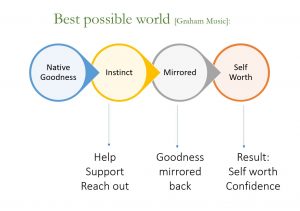24 Sep “Primed for Goodness” ~ Graham Music

“Primed for Goodness”
Are the words of attachment theorist Graham Music exploring infant research
| When we’re in the dumps it’s hard imagine things can ever be better. We feel trapped in the cycle of yucky, horrible, messy, never getting better.
We are, however, as Graham Music tells us, “primed for goodness” in his book Nurturing Natures (which I highly recommend – see below). Graham cites many research experiments that illustrate our inclination to help others and to prefer “good” rather than nice behaviors.
So many of the people I work with and interact with find themselves “stifling” their positive inclination. Too often our natural, “primed for goodness” impulse has gotten dynamically intertwined with needing an attachment reward or protecting against not getting the attachment connection we so longed for. The underlying inclination toward goodness is layered over by what we call in the Internal Family Systems (IFS) Model various parts of us that are holding protections and fears. Over time we repeat those patterns until they become so habitual they feel normal. We disconnect from our natural goodness. Yet that Native Goodness is naturally arising all the time. It's instinctive. Just like with the infants cited in the research above our natural inclination is to reach out to support or help others. In the best possible world, our goodness would be mirrored back, resulting in a sense of self-worth and confidence with interacting with others in the world. For those with trauma and attachment wounding, however, that natural process gets interrupted. But just because we’ve stifled our native goodness (for good reasons) doesn’t mean we’re doomed to be stifled, stuck, shut down or any other dastardly thing. It certainly doesn’t mean we won’t have access to self-worth now or in the future. In fact, the research gives us an important map back to ourselves. Your goodness is inherent within you. Your instinct to reach out is important. The “problem” was/is that you weren’t mirrored back in the way you wanted or needed, leaving you with a result that doesn’t feel good and certainly isn’t a model to live by. Reversing that trend is all part of the Becoming Safely Embodied Skills. Making room for your native goodness, supporting your instinct to connect and be related (what we call “prosocial”) is vital to your healing and living a fulfilling life, getting mirrored on who you really are, accepted for your entire range of experiences and presentations is a fundamental aspect of the course so that you cultivate the self worth and confidence to participate in creating a world in which we all want to live. |

